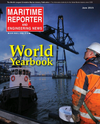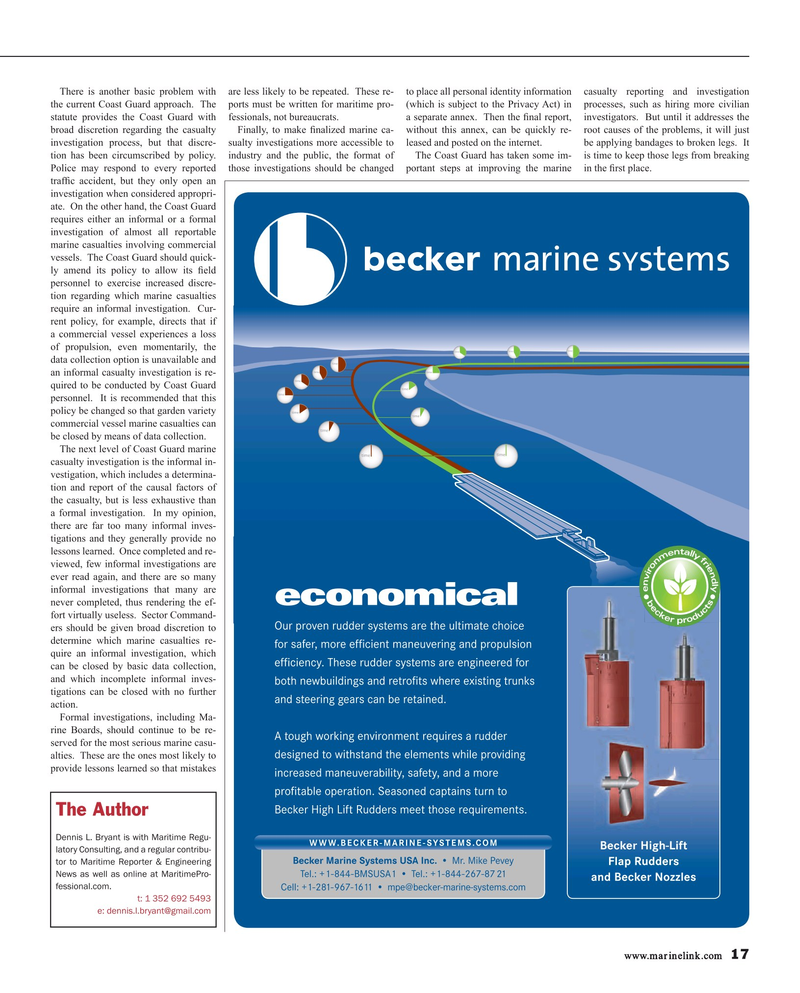
Page 17: of Maritime Reporter Magazine (June 2015)
Annual World Yearbook
Read this page in Pdf, Flash or Html5 edition of June 2015 Maritime Reporter Magazine
There is another basic problem with are less likely to be repeated. These re- to place all personal identity information casualty reporting and investigation the current Coast Guard approach. The ports must be written for maritime pro- (which is subject to the Privacy Act) in processes, such as hiring more civilian statute provides the Coast Guard with fessionals, not bureaucrats. a separate annex. Then the ? nal report, investigators. But until it addresses the broad discretion regarding the casualty Finally, to make ? nalized marine ca- without this annex, can be quickly re- root causes of the problems, it will just investigation process, but that discre- sualty investigations more accessible to leased and posted on the internet. be applying bandages to broken legs. It tion has been circumscribed by policy. industry and the public, the format of The Coast Guard has taken some im- is time to keep those legs from breaking
Police may respond to every reported those investigations should be changed portant steps at improving the marine in the ? rst place.
traf? c accident, but they only open an investigation when considered appropri- ate. On the other hand, the Coast Guard requires either an informal or a formal investigation of almost all reportable marine casualties involving commercial vessels. The Coast Guard should quick- ly amend its policy to allow its ? eld personnel to exercise increased discre- tion regarding which marine casualties require an informal investigation. Cur- rent policy, for example, directs that if a commercial vessel experiences a loss of propulsion, even momentarily, the time time time data collection option is unavailable and time time time an informal casualty investigation is re- time quired to be conducted by Coast Guard time time personnel. It is recommended that this time policy be changed so that garden variety time commercial vessel marine casualties can time be closed by means of data collection.
The next level of Coast Guard marine time time casualty investigation is the informal in- vestigation, which includes a determina- tion and report of the causal factors of the casualty, but is less exhaustive than a formal investigation. In my opinion, there are far too many informal inves- tigations and they generally provide no lessons learned. Once completed and re- viewed, few informal investigations are ever read again, and there are so many informal investigations that many are economical never completed, thus rendering the ef- fort virtually useless. Sector Command-
Our proven rudder systems are the ultimate choice ers should be given broad discretion to determine which marine casualties re- for safer, more ef? cient maneuvering and propulsion quire an informal investigation, which ef? ciency. These rudder systems are engineered for can be closed by basic data collection, and which incomplete informal inves- both newbuildings and retro? ts where existing trunks tigations can be closed with no further and steering gears can be retained. action.
Formal investigations, including Ma- rine Boards, should continue to be re-
A tough working environment requires a rudder served for the most serious marine casu- designed to withstand the elements while providing alties. These are the ones most likely to provide lessons learned so that mistakes increased maneuverability, safety, and a more pro? table operation. Seasoned captains turn to
Becker High Lift Rudders meet those requirements.
The Author
Dennis L. Bryant is with Maritime Regu-
WWW.BECKER-MARINE-SYSTEMS.COM
Becker High-Lift latory Consulting, and a regular contribu-
Becker Marine Systems USA Inc. • Mr. Mike Pevey tor to Maritime Reporter & Engineering
Flap Rudders
News as well as online at MaritimePro-
Tel.: +1-844-BMSUSA1 • Tel.: +1-844-267-8721 and Becker Nozzles fessional.com.
Cell: +1-281-967-1611 • [email protected] t: 1 352 692 5493 e: [email protected] www.marinelink.com 17
MR #6 (10-17).indd 17 MR #6 (10-17).indd 17 6/8/2015 11:17:54 AM6/8/2015 11:17:54 AM

 16
16

 18
18
